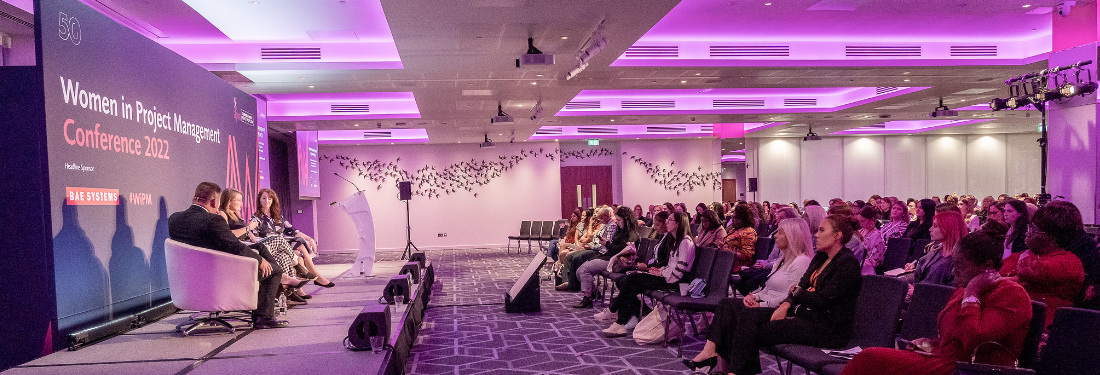Top career tips from APM’s Women in Project Management Conference 2022

This year’s WIPM conference had a special buzz about it and was crammed with delegates keen to glean invaluable advice, share stories and compare notes from women at every level of the profession. They were there to hear from experts, too, about how to navigate their careers as women and how to accelerate organisations’ ED&I efforts.
If you weren’t lucky enough to attend, then here are some of their top tips.
Flip your thinking, reverse mentoring and thought diversity
Sharon Parker-Brannan, Head of Project at Sellafield, told delegates that you need to flip your thinking when trying to attract new project professionals. Recruit to the needs of Generation Z, not your own needs, she advised. For Sellafield, positioned in the beautiful Lake District, this includes appealing to younger people who want to enjoy the lifestyle outside of work.
Meanwhile, Florence Hanlon, Strategic Advisory Manager at Mace, said reverse mentoring is a very effective way to cultivate intergenerational understanding.
Sam Olsen, Director of Workplace Transformation at the Department for Work and Pensions, encouraged delegates to consider diversity of thought (she is herself dyslexic) as a priority for project teams.
“Get the right people in the room and ensure that the culture and environment is right so that people have a voice,” she said. But remember, as a leader, it is your responsibility to understand the tribes people come from.
Find sponsors to champion you at senior levels
Harriet Clark, Vice President Sustainment at BAE Systems Air, said that being a female engineer and in the minority made her more visible as she climbed the corporate ranks.
“If you’re delivering, then people want you on the team,” she said. The challenges emerge with senior roles when unconscious bias becomes evident: there is a sense of ‘this is what a business leader should look, sound and behave like’, and that might not look like you. Her advice is to lean on sponsors to help you.
“There were sponsors who believed in me and who pushed the business to have me in the role,” she said.
Take a head office role
A role in group head office at BAE Systems gave Clark an unrivalled opportunity to see the business at plc level and to build her networks.
“If those opportunities arise, take them,” she said, as they have an accelerating impact on your career, as you will have a network of sponsors. She also advised women that “you don’t have to follow the same path as everyone else”.
Find the people you admire, but do a “pick ‘n’ mix” so you can find your own way through, she suggested.
You don’t need to know everything
Karen Elson is Knowledge Director at Co.Cre8 and her advice to the youngest generation of project professionals is: “People want new ideas and new perspectives. You don’t need to know everything.”
For those in mid-career who are looking to take the next step up, she recommended volunteering as a trustee for a charity that they care about. “It gives you board experience and confidence,” she said.
Meanwhile, Amy Morley, Programme Controls Director at HS2, said: “There is only one person who is responsible for my career development, and that is me.” So own your own path. She also reassured delegates that, while there is a fear of stepping out of the workforce to have a family, for her this was a positive experience, as she was promoted within a year of being back after her maternity leave.
Focus on improving empathy levels
Keynote speaker Belinda Parmar, CEO of The Empathy Business, gave her practical advice on how organisations and teams need to become more empathetic if they want to create a stronger sense of belonging among their workers and unite men and women. Making processes more empathetic can be as obvious as changing the language that is used in staff or customer communication.
To improve levels of empathy, the focus must be on making systems and processes empathetic, but Parmar also gave advice to individuals, who can cultivate greater empathy to become better leaders.
By listening to colleagues empathetically, sharing your own vulnerabilities, being courageous and having difficult conversations that can lead to change, you can connect better with your team, increase levels of engagement and enjoy better performance.
You may also be interested in:


0 comments
Log in to post a comment, or create an account if you don't have one already.